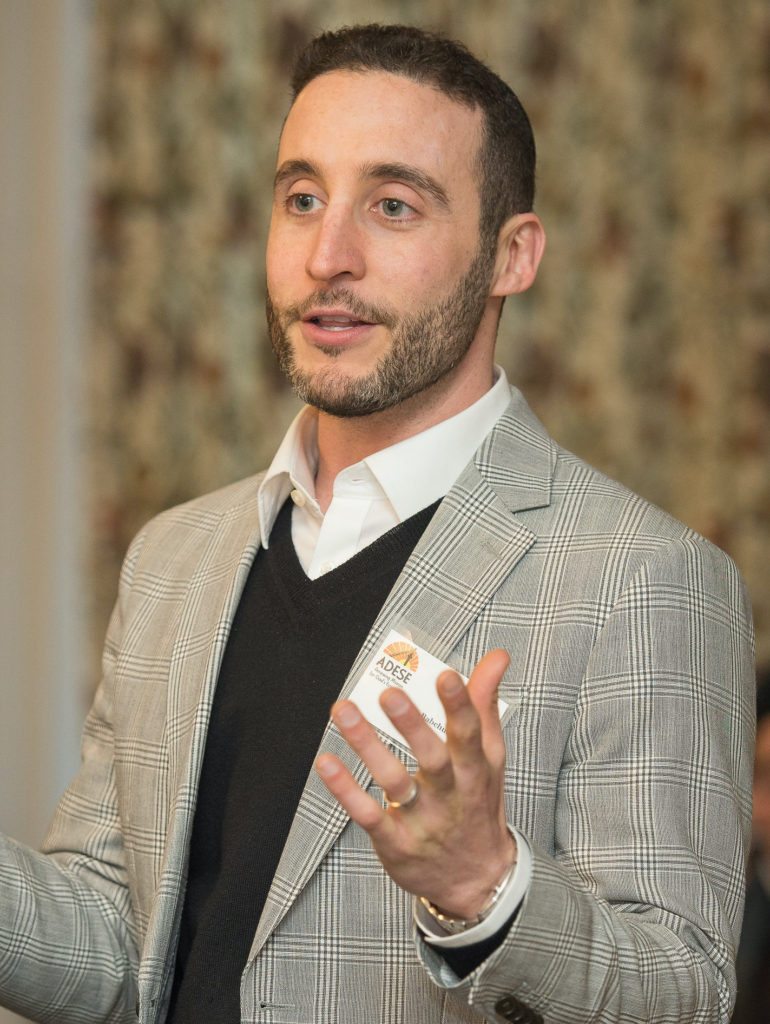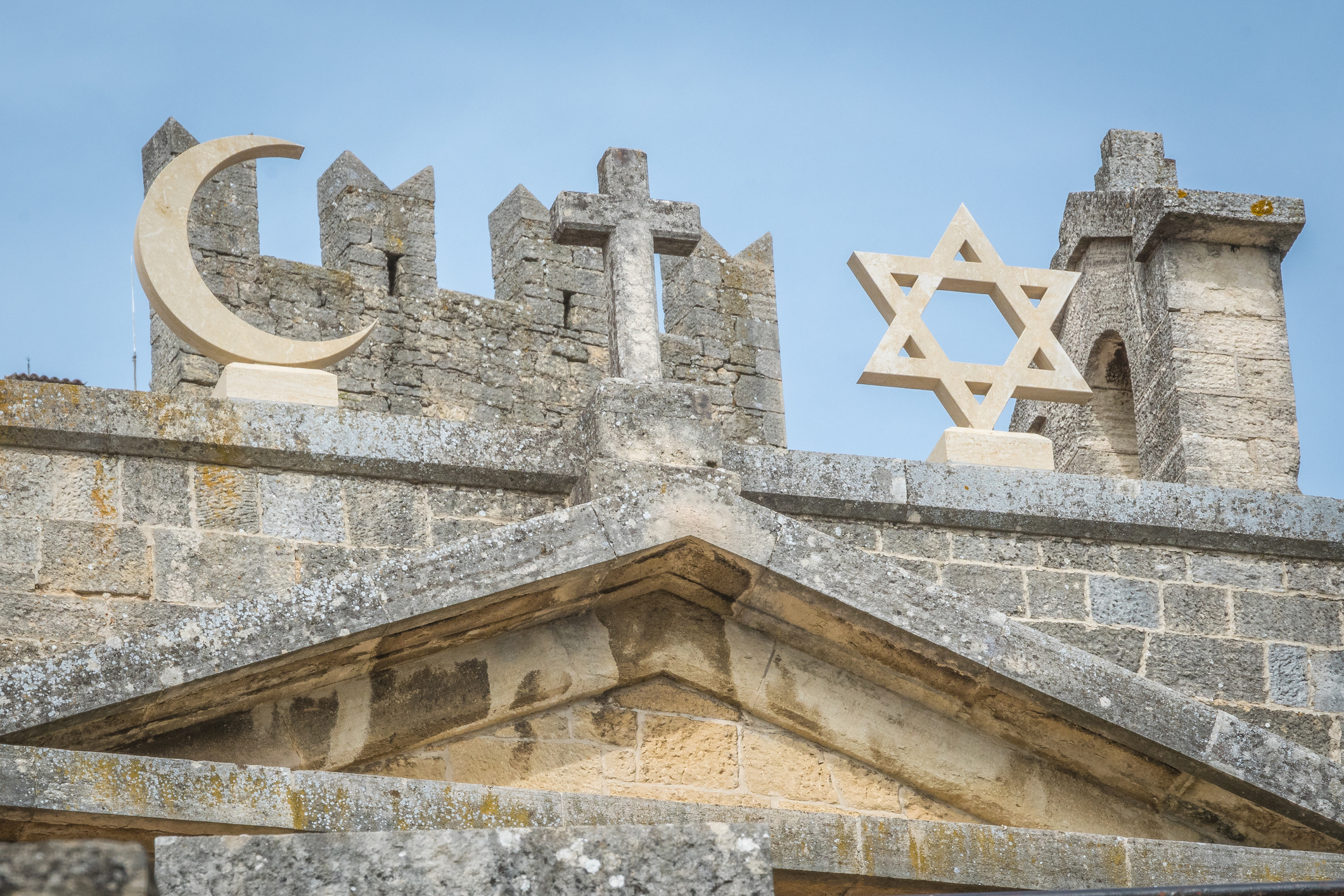Over the past 10 days, I’ve had the honor of facilitating heart-opening and sometimes very painful conversations among a number of leadership groups in the Jewish community, in several different cities. And, while the communities, viewpoints, and beliefs that each of those individuals represent are remarkably diverse, there was (at least) one common thread that tied them all together: it’s really hard to be Jewish right now.
Not that the rituals have gotten any more complicated, although several folks mentioned that just lighting Shabbat candles felt like a heavier task than usual when there are over 1,300 of our brothers and sisters who will never be able to do so again. And going to synagogue isn’t any more difficult, although a number of people whose synagogues employ multiple armed guards felt both more safe and deeply unsettled by their presence. And for the parents who send their kids to day school or Hebrew school, the act of dropping them off is no more challenging than it used to be, although hearing from their 3-year-olds that they played “hide and seek in the dark” (i.e. an active shooter drill) has kept said parents up for many sleepless nights.
What makes being Jewish so hard for those participants is the simple fact that they feel torn between the various identities that they hold, by the push and pull of the communities in which they move, by the consistent feelings of isolation and abandonment from people with whom they once marched in lockstep. Perhaps, as one leader shared with me after a recent session, it’s not that being Jewish is difficult. It’s being “Jewish and” that is so hard right now.
Jewish and progressive.
Jewish and Zionist.
Jewish and non-Zionist.
Jewish and American.
Jewish and secular.
Jewish and…
While the complexities of being “Jewish and” are particularly poignant today, they are, in fact, timeless. For as long as Jews have been Jews, they have been “Jewish and,” dating all the way back to Abraham, the first Jew, who introduced himself to his neighbors as a ger v’toshav – a resident stranger among them (Genesis 23:4). Like us, Abraham was grieving, in his case for his wife Sarah, who passed away at 127 years old. And perhaps also like us, he recognized that he was both a part of the people among whom he resides and – in his heart of hearts – a transient, too. He felt both a part of and apart from them.
In his lecture “A Stranger and a Resident”, Rav Joseph Soloveitchik shared a set of important insights into Abraham’s condition – his civic condition and his spiritual one, too.
“Abraham’s definition of his dual status describes with profound accuracy the historical position of the Jew who resides in a predominantly non-Jewish society…Like other people, the Jew has more than one identity. He is a part of the larger family of mankind, but he also has a Jewish identity which separates him from others. Each identity imposes upon him particular responsibilities. As a citizen of a pluralistic society, the Jew assumes the social and political obligation to contribute to the general welfare and to combat such common dangers as famine, corruption, disease, and foreign enemies. Where the freedom, dignity, and security of human life are at stake, all people—irrespective of ethnic diversity—are expected to join as brothers in shouldering their responsibilities. These are concerns which transcend all boundaries of difference.”
One book of Torah later, as Abraham’s descendants emerge from Egypt, the text describes the Israelite body politic as an erev rav – a mixed multitude (Exodus 12:38). Yes, the Israelites departed as one unit, but as Rashi notes, they had grown to become a “mingling of various nations” who had joined them in their journey.
Philo of Alexandria, a Hellenistic Jewish philosopher from the 1st century BCE in Egypt, noted that “leaving Egypt is a constant, individual struggle – made more difficult by the erev rav, the mixed multitude within each of us…To gain dominion over our inner erev rav is a constant process.”
Not only were our ancestors who escaped Egypt a surprisingly diverse group in terms of nationality, but they represented a deeply diverse inner life, too. They were mixed up spiritually and emotionally, struggling with the push of their inner Egypt and the pull of the promise that lay ahead. Thousands of years later, each of the beloved folks that I’ve spent time with over the past 10 days experiences that very same struggle, too.
Given the pain and the hurt that I heard from them, and that which I also feel deeply in my heart, how can we continue to live as “Jewish and” among our neighbors who have hurt us, disappointed us, isolated us, ignored us? How can we love our neighbors, even the ones who have done us harm?
Martin Buber (20th c Jewish philosopher) once recounted a teaching from Rabbi Shmelke of Nicholsburg (d.1778), who taught: “The Torah commands us to love our neighbors as ourselves. But how can you do this if your neighbor has hurt you? You must understand that this verse means love your neighbor like something which you yourself are,” (Tales of the Hasidim, Vol. 1, p. 190).
Just as our neighbors have hurt, disappointed, and isolated us, so, too have we done those very same things at some point or another, to some neighbor or another. And just as we are deserving of love – even when that love demands rebuke – so, too, are our neighbors deserving of love. While I have heard an overwhelming desire from these participants to simply excise those parts of their identities that are causing them distress today, it turns out that holding on to them is a means of holding on to ourselves, too.
Abraham was no more stranger than he was resident. Philo was no more Egyptian than he was a Jew. And perhaps each of us whose hearts pulse with pain is no more Jewish than we are “and”. But to love both – as fiercely as we can, as difficult as it feels today – might just be the most Jewish thing we can do at this moment.

Rabbi Elan Babchuck is committed to leaving behind a world that is more compassionate and connected than the one he found. In pursuit of that commitment he serves as the Executive Vice President at Clal, the National Jewish Center for Learning and Leadership, and the Founding Executive Director of Glean Network, which partners with Columbia Business School. He was ordained in 2012, and earned his MBA that year, as well.
A sought-after thought leader, he has delivered keynotes at stages ranging from TEDx to the US Army’s General Officer Convocation, published in The Atlantic, The Guardian, Washington Post, and Religion News Service, has a column for The Wisdom Daily, contributed to Meaning Making – 8 Values That Drive America’s Newest Generations (2020, St. Mary’s Press) and is the co-author of the forthcoming book Picking Up the Pieces: Leadership After Empire (2023, Fortress Press).
He also serves as:
a Founding Partner of Starts With Us, a movement to counteract toxic polarization in America,
a Research Advisory Board Member of Springtide Research Institute, which focuses on spirituality, mental health and Gen Z,
a founding board member of Beloved Network, a network of startup Jewish communities, and
a member of the Board of Advisors of the Changemaker Initiative.
He lives in Providence, Rhode Island with his wife, Lizzie Pollock, and their three children: Micah, Nessa, and Ayla. In his spare time, he finds sanctuary while climbing rock walls around New England and tending to his backyard garden.

